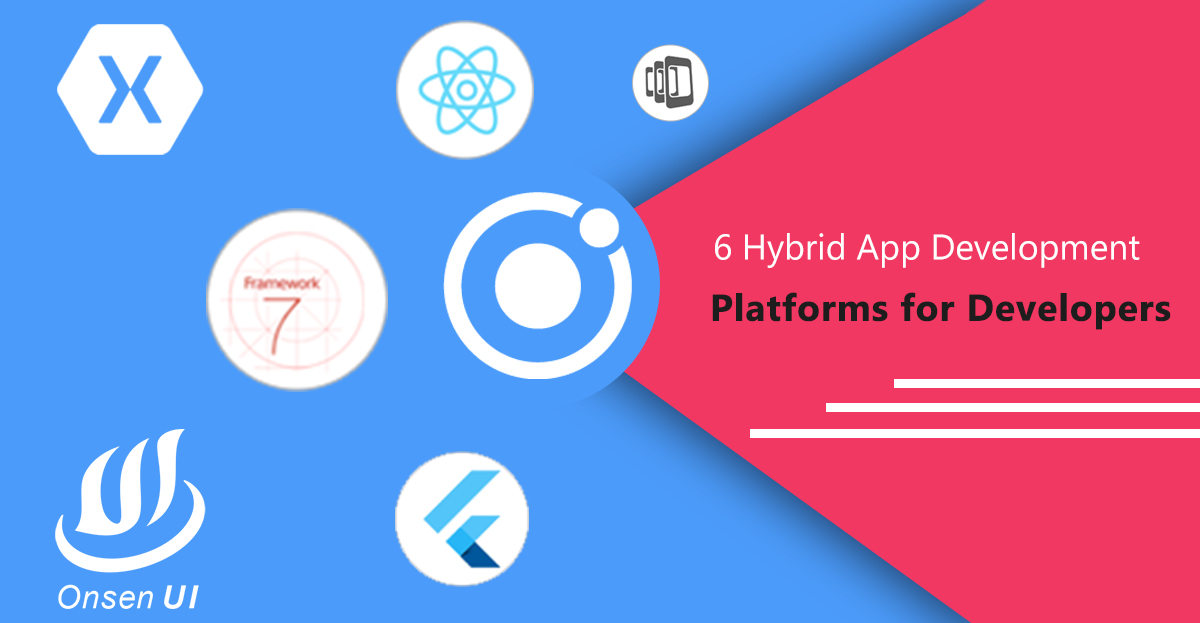Top Hybrid App Development Platforms for Developers (2023 Updated)
Published On : August 8, 2023 Category(s) : Mobile App Development
What is the best way to be successful in your business? Is coding your ideas in a successful app sufficient?
If you are an app developer then it’s not completely true. Along with this, you require to know about some useful platforms. They can help you in saving a lot of energy and time as well as a good amount of money.
Choose Hybrid App Development instead of Native App Development:
The brightest choice of business owners around the globe are the two most popular app development platforms, namely; iOS app development and Android App development.
Your first target as a mobile app developer should be to speed up your development process. With the growing introduction of advanced technology, there are many platforms that can serve this purpose in the contemporary world. These time-saving platforms should be your top-most priority.
This will also make the process of coding things a stressfree task. These are not the only benefits of cross-platform app development. There are many more advantages which are attached to it.
With the increasing number and types of devices, it is vital to develop apps that are compatible with different devices. You can use the following tools to solve the purpose:
- Appcelerator:
This tool is used to construct applications with JavaScript programming requirements for cross-platform app development. This tool not only helps developers to create and connect but it also assists in testing and measuring the functionality of the hybrid applications. Therefore, it helps to build, connect and test apps.
Pros:
It allows the rapid application development process to be conducted without any hindrance. It makes this possible by easily measuring the app performance. Moreover, it checks the user’s UI interaction with the app. It is quite easy to develop a prototype of the app quickly in a hassle-free manner.
Cons:
Do you like a slow platform? Obviously, no! This platform is a little slow, so it can be annoying. It becomes frustrating for cross-platform app developers. Apart from this, the community support is also poor. This is disappointing but developers can receive good service in case of the latest version.
- PhoneGap (Apache Cordova)
In today’s world of digitalization, work is done from different locations. The team of developers, project managers, and team leaders might be located in different places. This platform bridges that gap. It helps designers and developers to allow supervisors to track the progress of work by capturing it with device’s camera.
Pros:
It is the best support for the dynamic web technologies like JavaScript, CSS3, HTML5 etc. The coding time and the apps’ reusability can be enhanced to a great extent. Windows phone, Android, iOS, Blackberry, Firefox OS are supported.
Cons:
With graphic-intensive apps, the platform is known for showing issues and bugs. Such performance issues can be sorted with the mobile app development services of a third-party.
- Kony App Platform
Less coding and less time is the topmost priority of every developer of hybrid apps. This platform supports low-code development. It is well-known all around the world for allowing cross-platform developers to create brilliant apps giving vast audience reach.
Pros:
It is beginner-friendly because this platform provides many pre-made sample apps. You can start with them instead of starting from scratch. Moreover, almost all back-end systems are supported by this platform.
Cons:
The major limitation of this platform is the lack of enough documentation. In other words, there is almost no support which is available for hybrid app developers. Here, it becomes a challenge for beginners as they will not receive any kind of guidance.
- Xamarin
It provides a lot of options to hybrid app developers like to apply C# codebase to multiple platforms to create cross-platform apps. This platform allows developers to work with native API and IDE that is not available in any other platform.
Pros:
It allows beginners to start in an easy and quick way. Xamarian app developers can share 3/4th code on different important mobile platforms. Moreover, it helps in reducing development costs.
Cons:
It has shown some great issues incompatibility with open-source libraries. This is not at all appreciated by cross-platform app developers.
- Sencha Ext JS:
It is the best option if your target is to create a highly dynamic with strong-built data-extensive hybrid apps which can leverage hardware acceleration techniques. This option can be utilized as a cross-platform app development platform without thinking twice.
Pros:
It provides native-looking built-in themes for almost all major platforms. With different data sources, it allows working independently of the backend data packages. Moreover, it is compatible with Blackberry, Android, iOS, Windows Phone etc and this is one important thing.
Cons:
In this platform, there is comparatively less number of themes available for developing the apps.
- Adobe Build:
This framework is majorly responsible for the code compilation. It works along with Cordova or PhoneGap. This allows the hybrid app developers to achieve their specific targets as well as reduces the overall time taken for the delivery of the app. Moreover, it is supportive of creating the best quality projects.
Pros:
With a few lines of JavaScript due to API access, Geolocation, camera and contacts are made convenient. This platform is excellent for enterprises as well as businesses with their strict time limits and heavy competition.
Cons:
The major problem that lies with this platform is speed. This hampers the efficient and quick processing of JavaScript. So, hybrid app developers might face problems in the development process.
Conclusion:
We have discussed above the benefits and drawbacks of the top 6 hybrid app development frameworks. With this information, businesses can make well-informed choices in relation to their app development requirements and select what suits the best to the kind of their app.

Leave a Reply